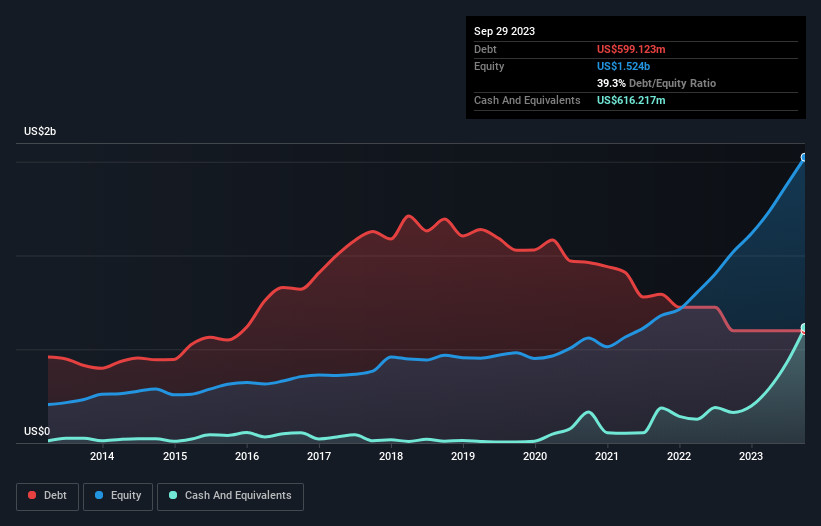- United States
- /
- Beverage
- /
- NasdaqGS:COKE
Coca-Cola Consolidated (NASDAQ:COKE) Seems To Use Debt Rather Sparingly

Legendary fund manager Li Lu (who Charlie Munger backed) once said, 'The biggest investment risk is not the volatility of prices, but whether you will suffer a permanent loss of capital.' So it seems the smart money knows that debt - which is usually involved in bankruptcies - is a very important factor, when you assess how risky a company is. We note that Coca-Cola Consolidated, Inc. (NASDAQ:COKE) does have debt on its balance sheet. But is this debt a concern to shareholders?
What Risk Does Debt Bring?
Debt and other liabilities become risky for a business when it cannot easily fulfill those obligations, either with free cash flow or by raising capital at an attractive price. Part and parcel of capitalism is the process of 'creative destruction' where failed businesses are mercilessly liquidated by their bankers. However, a more frequent (but still costly) occurrence is where a company must issue shares at bargain-basement prices, permanently diluting shareholders, just to shore up its balance sheet. Of course, plenty of companies use debt to fund growth, without any negative consequences. When we examine debt levels, we first consider both cash and debt levels, together.
See our latest analysis for Coca-Cola Consolidated
What Is Coca-Cola Consolidated's Net Debt?
The chart below, which you can click on for greater detail, shows that Coca-Cola Consolidated had US$599.1m in debt in September 2023; about the same as the year before. But it also has US$616.2m in cash to offset that, meaning it has US$17.1m net cash.

How Healthy Is Coca-Cola Consolidated's Balance Sheet?
The latest balance sheet data shows that Coca-Cola Consolidated had liabilities of US$907.8m due within a year, and liabilities of US$1.71b falling due after that. Offsetting this, it had US$616.2m in cash and US$648.5m in receivables that were due within 12 months. So it has liabilities totalling US$1.35b more than its cash and near-term receivables, combined.
Of course, Coca-Cola Consolidated has a market capitalization of US$8.43b, so these liabilities are probably manageable. However, we do think it is worth keeping an eye on its balance sheet strength, as it may change over time. Despite its noteworthy liabilities, Coca-Cola Consolidated boasts net cash, so it's fair to say it does not have a heavy debt load!
On top of that, Coca-Cola Consolidated grew its EBIT by 48% over the last twelve months, and that growth will make it easier to handle its debt. When analysing debt levels, the balance sheet is the obvious place to start. But it is Coca-Cola Consolidated's earnings that will influence how the balance sheet holds up in the future. So when considering debt, it's definitely worth looking at the earnings trend. Click here for an interactive snapshot.
Finally, a company can only pay off debt with cold hard cash, not accounting profits. While Coca-Cola Consolidated has net cash on its balance sheet, it's still worth taking a look at its ability to convert earnings before interest and tax (EBIT) to free cash flow, to help us understand how quickly it is building (or eroding) that cash balance. Over the most recent three years, Coca-Cola Consolidated recorded free cash flow worth 60% of its EBIT, which is around normal, given free cash flow excludes interest and tax. This cold hard cash means it can reduce its debt when it wants to.
Summing Up
Although Coca-Cola Consolidated's balance sheet isn't particularly strong, due to the total liabilities, it is clearly positive to see that it has net cash of US$17.1m. And we liked the look of last year's 48% year-on-year EBIT growth. So we don't think Coca-Cola Consolidated's use of debt is risky. When analysing debt levels, the balance sheet is the obvious place to start. But ultimately, every company can contain risks that exist outside of the balance sheet. Case in point: We've spotted 1 warning sign for Coca-Cola Consolidated you should be aware of.
If, after all that, you're more interested in a fast growing company with a rock-solid balance sheet, then check out our list of net cash growth stocks without delay.
New: AI Stock Screener & Alerts
Our new AI Stock Screener scans the market every day to uncover opportunities.
• Dividend Powerhouses (3%+ Yield)
• Undervalued Small Caps with Insider Buying
• High growth Tech and AI Companies
Or build your own from over 50 metrics.
Have feedback on this article? Concerned about the content? Get in touch with us directly. Alternatively, email editorial-team (at) simplywallst.com.
This article by Simply Wall St is general in nature. We provide commentary based on historical data and analyst forecasts only using an unbiased methodology and our articles are not intended to be financial advice. It does not constitute a recommendation to buy or sell any stock, and does not take account of your objectives, or your financial situation. We aim to bring you long-term focused analysis driven by fundamental data. Note that our analysis may not factor in the latest price-sensitive company announcements or qualitative material. Simply Wall St has no position in any stocks mentioned.
About NasdaqGS:COKE
Coca-Cola Consolidated
Manufactures, markets, and distributes nonalcoholic beverages primarily products of The Coca-Cola Company in the United States.
Flawless balance sheet with proven track record and pays a dividend.
Similar Companies
Market Insights
Community Narratives




